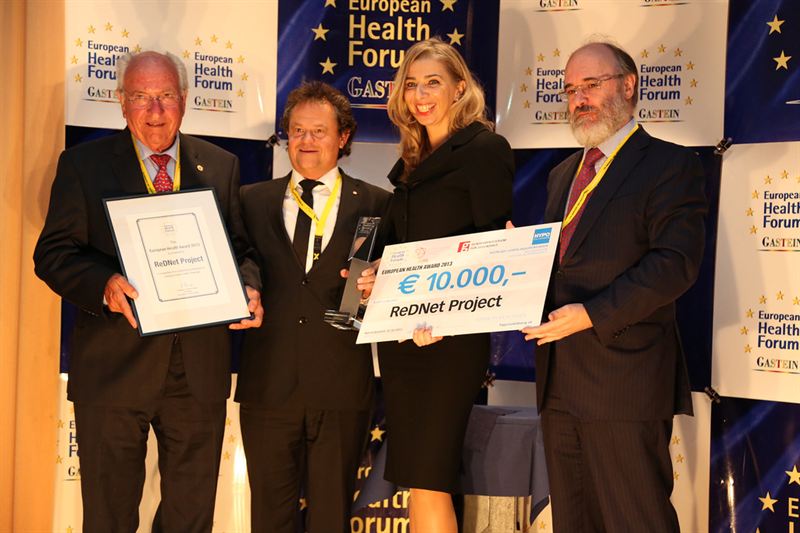ReDNet, the prevention project on new drugs, scoops top European Health Award

The prestigious European Health Award 2013 has been awarded to Dr Ornella Corazza for the Recreational Drugs European Network (ReDNet), a collaborative prevention project on new psychoactive drugs led by University of Hertfordshire researchers Professor Fabrizio Schifano and Dr Corazza.
Every week, a new psychoactive substance pops up on the Internet. Just an easy ‘click away’ from our homes, these drugs are potentially available to everyone, and especially young people who are most at risk. With very limited knowledge about the effects and health risks of these drugs, the ReDNet project was set up to identify and research these dangerous chemicals and to provide evidence-based information to risk groups, health care providers and policy makers.
On receiving the award, ReDNet Manager Dr Ornella Corazza said: “I would like to thank the European Health Forum Gastein for this important award also on behalf of my ReDNet colleagues based in ten research centres across the European Union and research collaborators, including the European Monitoring Centre for Drugs and Drug Addiction (EMCDDA), who made this possible through hard work and effective partnership.
“So far in 2013, more than one new substance has been reported every week. It is a challenge that needs rapid and innovative responses. This European Health Award is an acknowledgement of our efforts to respond quickly and innovatively to this challenge.”
The emergence of new psychoactive substances (NPSs) has led to unpredictable challenges in terms of public health in Europe. Often advertised on the Internet as legal and safer alternatives to illicit drugs, these substances appear very quickly on the drug market and may have widespread and long-term effects on users' health.
ReDNet, sponsored by the European Commission, was able to improve intelligence and generate original data on the availability and misuse of over 700 new psychoactive substances and products. The project monitors the Internet on a daily basis in eight different languages and disseminates evidence-based information via a multitude of tools - such as mobile phone technology, virtual learning environments, video-clips, social networking and a large number of scientific publications.
Dr Corazza concluded: “ReDNet currently provides information on new psychoactive substances and services to vulnerable individuals, health and other professionals, policy makers and regulatory authorities in over 30 countries. This has increased awareness of risks, health prevention initiatives, policies and treatment provision in a rather unique way.”
The innovative ReDNet project received the renowned European Health Award at the European Health Forum Gastein 2013 (EHFG 2013), beating five other cross-border initiatives that were also nominated.
ENDS
For more information, please contact Julie Cooper, University of Hertfordshire Press Office on 01707 284095, Email: j.cooper5@herts.ac.uk
Notes to Editor
About the University of Hertfordshire
The University is the UK’s leading business-facing university and an exemplar in the sector. It is innovative and enterprising and challenges individuals and organisations to excel.
The University of Hertfordshire is one of the region’s largest employers with over 2,650 staff and a turnover of almost £233 million.
With a student community of over 27,200 including more than 2,800 students from eighty-five different countries, the University has a global network of over 175,000 alumni.
It is also one of the top 100 universities in the world under 50 years old, according to the new Times Higher Education 100 under 50 rankings 2012.
For more information, please visit www.herts.ac.uk
Tags:


